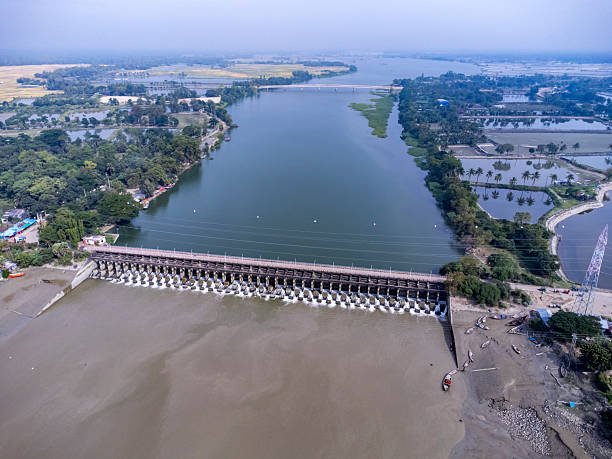Research Topics Related to Hydrology
Hydrology is the scientific study of water—its movement, distribution, and quality on Earth. It plays a vital role in understanding and managing one of our planet’s most essential natural resources. From rainfall and rivers to groundwater and glaciers, hydrology research helps us tackle global challenges like water scarcity, flooding, pollution, and climate change.
If you’re a student, researcher, or professional looking for research topics related to hydrology, this comprehensive guide explores a wide range of categories including surface water hydrology, groundwater hydrology, water quality, hydrological modeling, and climate-water interactions. Each category includes well-listed, practical, and modern research ideas that can inspire impactful studies.
Surface Water Hydrology Research Topics
Surface water hydrology focuses on rivers, lakes, reservoirs, and streams, studying how water flows and behaves above the ground surface.
- Hydrological response of river basins to land use changes
- Assessing flood frequency and risk in urbanized catchments
- The role of vegetation in streamflow regulation
- Modeling rainfall–runoff relationships in tropical regions
- River discharge analysis using hydrological time series
- Sediment transport and erosion in watershed management
- The impact of dam construction on river ecosystems
- Surface water availability under changing climatic conditions
- Quantifying evapotranspiration in semi-arid environments
- Application of remote sensing in surface water mapping
Groundwater Hydrology Research Topics
Groundwater is a crucial component of the hydrologic cycle and a primary source of fresh water for agriculture and domestic use. Research in this field helps manage aquifers sustainably and prevent depletion.
- Groundwater recharge estimation using isotopic and hydrological methods
- Assessment of groundwater contamination from agricultural activities
- Mapping groundwater potential zones using GIS and remote sensing
- Modeling groundwater flow and storage in alluvial aquifers
- Impact of over-pumping on groundwater quality and quantity
- Salinity intrusion in coastal aquifers due to sea-level rise
- Hydrogeochemical characterization of groundwater resources
- Sustainable groundwater management in arid regions
- Groundwater–surface water interactions in river basins
- Climate change impacts on groundwater recharge rates
Water Quality and Pollution Research Topics
Maintaining water quality is essential for human health, ecosystem balance, and sustainable development. Hydrology research helps in understanding sources of contamination and developing mitigation strategies.
- Spatial variation of water quality in river systems
- Impact of industrial effluents on surface water chemistry
- Assessment of heavy metal contamination in groundwater
- Eutrophication and nutrient loading in lakes and reservoirs
- Modeling pollutant transport in river catchments
- Effects of agricultural runoff on drinking water sources
- Microplastic contamination in freshwater systems
- Evaluation of water treatment methods for rural communities
- Relationship between urbanization and water pollution
- Seasonal variation in physicochemical properties of water
Hydrological Modeling and Simulation Research Topics
Hydrological modeling helps in understanding water flow, forecasting floods, and managing water resources more effectively through computational and statistical techniques.
- Application of SWAT (Soil and Water Assessment Tool) in watershed modeling
- Calibration and validation of rainfall-runoff models in humid regions
- Comparative analysis of hydrological models for flood prediction
- Using machine learning algorithms in hydrological forecasting
- Uncertainty analysis in hydrological model predictions
- Integrating remote sensing data with hydrological models
- Estimation of evapotranspiration using satellite-based models
- Distributed vs. lumped hydrological modeling approaches
- Simulation of water balance in small catchments
- Real-time flood prediction systems using hydrological models
Climate Change and Hydrology Research Topics
The interaction between hydrology and climate is one of the most critical areas of modern research. Understanding how global warming affects rainfall, runoff, and water resources is essential for future planning.
- Impact of climate change on river discharge and streamflow
- Hydrological drought assessment in changing climates
- Rainfall pattern variability under different climate scenarios
- Modeling the effects of temperature rise on water availability
- Changes in snowmelt runoff timing in mountainous regions
- Long-term hydrological trends in relation to global warming
- Hydrological extremes: Floods and droughts in a warming world
- Role of hydrology in climate adaptation strategies
- Downscaling climate models for hydrological impact assessment
- Assessing climate resilience in water management systems
Watershed and Water Resource Management Research Topics
Watershed management ensures sustainable water use and ecosystem balance across regions. These topics focus on planning, conservation, and sustainable water practices.
- Integrated watershed management and land use planning
- Water resource allocation in multi-user catchments
- Assessment of hydrological services in forested watersheds
- Watershed restoration and its impact on water yield
- Evaluation of rainwater harvesting systems in semi-arid areas
- Role of community participation in water resource management
- River basin management under competing demands
- Application of GIS in watershed prioritization
- Managing transboundary water resources for regional cooperation
- Economic valuation of hydrological ecosystem services
Urban Hydrology Research Topics
Urban hydrology deals with how water behaves in cities, focusing on stormwater management, flooding, and sustainable urban drainage systems (SUDS).
- Impact of impervious surfaces on stormwater runoff
- Design and performance of green infrastructure for flood control
- Modeling urban flooding under extreme rainfall events
- Rainwater harvesting potential in metropolitan areas
- Urban water management for climate resilience
- Groundwater recharge through permeable pavements
- Assessing flood vulnerability using GIS tools
- Role of vegetation in reducing urban runoff
- Stormwater pollution and its environmental implications
- Smart technologies in urban water management systems
Conclusion
Hydrology is not just a study of water—it’s a key to sustainability, environmental management, and climate resilience. Whether you’re studying groundwater contamination, flood prediction, or the hydrological impacts of climate change, choosing the right topic is the first step toward meaningful research.
Each of the research areas discussed above provides a foundation for projects that can address real-world water challenges and contribute to sustainable development goals (SDGs).
FAQs on Hydrology Research Topics
1. What is the importance of hydrology in environmental research?
Hydrology is crucial because it helps in understanding the movement and distribution of water, which directly affects ecosystems, agriculture, and human settlements. It also supports effective water resource management and flood control.
2. How do I choose a good hydrology research topic?
Select a topic that aligns with your academic background, available data, and local or regional water challenges. Consider emerging issues like climate change, groundwater depletion, or water pollution.
3. What tools and technologies are used in hydrological research?
Common tools include GIS, remote sensing, hydrological models (like SWAT and HEC-HMS), statistical analysis software, and satellite data for monitoring and prediction.
4. What are some trending research areas in hydrology?
Trending areas include climate-hydrology interactions, water quality modeling, hydrological data analytics using AI, sustainable watershed management, and flood risk prediction.
5. Can hydrology research contribute to solving water scarcity?
Yes. Hydrology provides insights into groundwater recharge, efficient water storage, and sustainable water use practices that help address water scarcity and promote long-term resource management.
ALSO READ: Research Topics Related to Geography







One Comment